|
|
|
Sort Order |
|
|
|
Items / Page
|
|
|
|
|
|
|
| Srl | Item |
| 1 |
ID:
124148
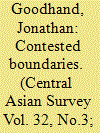

|
|
|
|
|
| Publication |
2013.
|
| Summary/Abstract |
In recent years there has been a growing focus in academic and policy circles on the changing roles of military and civilian actors in the context of multi-mandate peace and stabilization operations. This focus on 'civil-military cooperation' (CIMIC) and the related notion of the 'security-development nexus' reflect changed thinking about the causes of (and solutions to) to wars and insecurity, the role of external actors, and the balance between 'hard' and 'soft' forms of intervention. This article explores the civil-military interface in Afghanistan, focusing on the changing role of NGOs and specifically their growing but troubled relationship with externally promoted statebuilding and counterinsurgency. A recurring theme in the article is that of contested boundaries; CIMIC has been the site of intensive 'boundary work' in which NGOs and the military seek to negotiate or contest where boundaries are drawn and who has the power to draw (and police) them.
|
|
|
|
|
|
|
|
|
|
|
|
|
|
|
|
| 2 |
ID:
124151


|
|
|
|
|
| Publication |
2013.
|
| Summary/Abstract |
This article focuses on the 2010-2011 Special Election Court crisis, which serves as a microcosm of the broader post-2001 political network dynamics in which opportunistic practices of bargaining and the instrumentalization of identities have emerged as key features of Afghan politics. Post-2001 international state-building has produced a 'network state' where the state and political networks have become co-constitutive in state-building. This has produced the democratic façade of a state, underpinned by informal power structures and networks. In light of this analysis, a successful international exit from Afghanistan and post-2014 state survival may depend as much on the political stability of the empowered networks as on the strength of the Afghan National Security Forces and the outcome of the ongoing reconciliation and negotiation with the Taliban.
|
|
|
|
|
|
|
|
|
|
|
|
|
|
|
|
| 3 |
ID:
124155
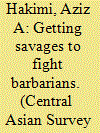

|
|
|
|
|
| Publication |
2013.
|
| Summary/Abstract |
This article focuses on the emergence and evolution of the Afghan Local Police (ALP), a pro-government militia supported by the US military in Wardak Province. The ALP and its previous incarnations have been justified, invoking notions of 'local solutions' and 'cost-effectiveness', as a politically convenient and culturally appropriate measure to supplement broader efforts to counter the insurgency and build up the regular forces. Inspired by the tribal policing concept of arbaki, ALP was envisaged as a short-term local defence force. But the programme has been controversial, and its impact in improving security questionable. In analysing the contestations between different actors involved in the programme, the article demonstrates that the US military's attempt to resuscitate 'age-old traditions' of self-protection proved difficult to realize and produced unforeseen and largely deleterious outcomes. It concludes that far from reflecting the needs of local villagers, ALP was a top-down imposition whose objectives were much narrower than the purported aim of protecting the local population in Wardak.
|
|
|
|
|
|
|
|
|
|
|
|
|
|
|
|
| 4 |
ID:
124153
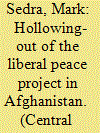

|
|
|
|
|
| Publication |
2013.
|
| Summary/Abstract |
Security sector reform (SSR) has been described as a linch-pin of the liberal state-building and peace-building processes in Afghanistan. The process was originally framed in accordance with the core liberal principles of the SSR model, prioritizing good governance, respect for human rights, sustainability, and democratic civilian control. However, as time passed and security and political conditions began to deteriorate on the ground, the process would gradually revert to a more conventional train-and-equip form, with its core liberal principles stripped away. The slide toward expediency experienced by the SSR process in Afghanistan demonstrates the deeply flawed manner in which the liberal peace project was advanced in Afghanistan. SSR donors became increasingly ambivalent about the human-security objectives of SSR, which were superseded by exigencies of the counterinsurgency, regional security, and domestic pressure for withdrawal. The Afghan experience has raised further doubt about the viability of the orthodox SSR model in conflict-affected countries, already the subject of significant critical debate.
|
|
|
|
|
|
|
|
|
|
|
|
|
|
|
|
| 5 |
ID:
124150
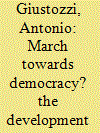

|
|
|
|
|
| Publication |
2013.
|
| Summary/Abstract |
Although the post-2001 period in Afghanistan has been hailed as a return to an earlier process of democratic opening that was interrupted in the early 1970s, a comparison of the development of political movements up to 1978 and then after 2001 highlights important differences. Until the late 1960s, Afghan political parties were mainly focused on influencing a supposedly enlightened leadership towards faster modernization of the country. Their disillusion was beginning to push them towards the development of forms of organization which could mobilize sections of the population on their behalf, even if tentatively so. Little comparable effort was noticeable after 2001, when parties big and small, seemed intent mainly on securing a position from which to develop a following based on the distribution of patronage. It could be argued that the availability of resources on a large scale following international intervention in 2001 drove the Afghan political system in a direction quite different from the path which was initially embarked upon in the 1960s.
|
|
|
|
|
|
|
|
|
|
|
|
|
|
|
|
| 6 |
ID:
124156


|
|
|
|
|
| Publication |
2013.
|
| Summary/Abstract |
This article explores Western attempts to strengthen mechanisms of informal justice in Afghanistan. It traces the origins and evolution of an 'informal justice assemblage': the constellation of specific expert discourses, institutional practices, and strategic considerations that made it possible and plausible that Western actors should promote and work with informal processes of justice. The article problematizes expert statements that posit that working with informal justice is somehow more 'Afghan-led' and less of an outside imposition than supporting the country's formal justice system. To the contrary, this article details how - discursively and institutionally - academic authority about what is locally appropriate in practice served to foreclose national debate and scrutiny about the organization and administration of justice. This amounted to a net erosion of accountability, reinforced by the subsequent militarization of the justice sector and governance more broadly. In conclusion, the article calls for greater attention to the broader fields of power in which claims of sensitivity to the local sentiments and reality in Afghanistan are made.
|
|
|
|
|
|
|
|
|
|
|
|
|
|
|
|
| 7 |
ID:
124152
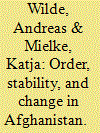

|
|
|
|
|
| Publication |
2013.
|
| Summary/Abstract |
This article presents findings from long-term empirical fieldwork and archival research into current and historical patterns of governance in north-eastern Afghanistan, conducted between 2006 and 2009. Despite the long civil war, striking continuities have been found in the make-up and functioning of the local social order. Patron-client relations, eldership, and related practices of mediation are crucial structuring principles of rural society. They have dominated Afghan politics over centuries and still do today. Viewed from a long-term perspective, this continuity, related patterns of representation, and the role of middlemen and brokers suggest a certain degree of stability, in contrast to the popular perception of instability and disorder in this country. Whilst in the past the expansion of the state relied on tacit agreement between government administrators and local elites, resulting in state-making from above, the war broadly changed actors, regimes, and coalitions, but not the underlying mechanisms of the social order. Hence, today, the failure of the current state-building project can be attributed to the fact that the effects of these mechanisms are insufficiently recognized and grasped by Western actors and state-builders. We argue that local Afghan actors have captured the intervention from below. Instead of state-building, we are dealing here with state-making dominated by patronage networks.
|
|
|
|
|
|
|
|
|
|
|
|
|
|
|
|
| 8 |
ID:
124145
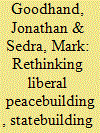

|
|
|
|
|
| Publication |
2013.
|
| Summary/Abstract |
This special issue coincides with a period of large-scale international troop withdrawals from Afghanistan, with a scheduled transition to 'Afghan ownership' in 2014. This latest 'transition' in Afghanistan's protracted conflict represents an interesting juncture at which to analyse and assess the record of statebuilding efforts in the country and their wider implications. In many respects, the changing narratives around intervention and statebuilding in Afghanistan resonate with and reflect wider shifts in thinking and policies related to security, peacebuilding, and statebuilding.
|
|
|
|
|
|
|
|
|
|
|
|
|
|
|
|
| 9 |
ID:
124146
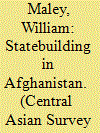

|
|
|
|
|
| Publication |
2013.
|
| Summary/Abstract |
The process of statebuilding in Afghanistan since 2001 has been complicated by a diverse set of problems, including the unintended consequences of early political decisions, the choice of institutional forms that have fostered dysfunctional policy-making, and the slide towards a neopatrimonial system combining bureaucracy with patronage. These problems have had a corrosive effect on the statebuilding enterprise, leaving an ambiguous legacy as Afghanistan proceeds towards one of the most challenging phases of its modern history.
|
|
|
|
|
|
|
|
|
|
|
|
|
|
|
|
| 10 |
ID:
124147
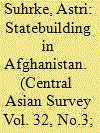

|
|
|
|
|
| Publication |
2013.
|
| Summary/Abstract |
This article lays out a critical perspective on statebuilding in Afghanistan after 2001, arguing that the massive international intervention had inherent contradictions which undermined the prospect of creating an Afghan-owned, liberal new order. Tensions related to the rentier-state condition, local ownership versus international control, and building peace while waging war are examined in detail. It follows from this analysis that the scaling-back of the international presence, now in process, is a necessary precondition for more accountable, autonomous, and sustainable statebuilding. The transition itself may be violent, with intensified competition for power and over new sources of rent. Yet it opens up new space for the Afghans themselves to re-establish a functioning and legitimate state, based on long-term bargains between elites and subjects and a measure of compromise among contesting ethnic and sectarian groups.
|
|
|
|
|
|
|
|
|
|
|
|
|
|
|
|
| 11 |
ID:
124149


|
|
|
|
|
| Publication |
2013.
|
| Summary/Abstract |
NATO troops are leaving Afghanistan in 2014, a quarter of a century after Soviet troops ended their occupation. How comparable are the two retreats, and will Afghans suffer fighting and destruction similar to what happened when foreign troops last left? Mikhail Gorbachev, who took the withdrawal decision in 1985, felt the war had become an expensive stalemate. The USSR opted to base its exit strategy on diplomacy and the idea that the Afghan government should pursue peace talks with its armed opponents. This emphasis on negotiations differs from Obama's policy, which remains predominantly military and rejects compromise with the Taliban. Obama and NATO claim progress on the battlefield and argue that combat duties can safely be "transitioned" to newly trained Afghans. But most Afghans are gloomy. Although they do not expect Kabul to fall to the Taliban, they believe that the insurgents will capture large parts of southern Afghanistan. Many also fear that ethnic tensions will grow throughout the country, perhaps leading to conflict between warlords from the Tajik and Uzbek minorities and the Pashtun majority.
|
|
|
|
|
|
|
|
|
|
|
|
|
|
|
|
|
|
|
|
|